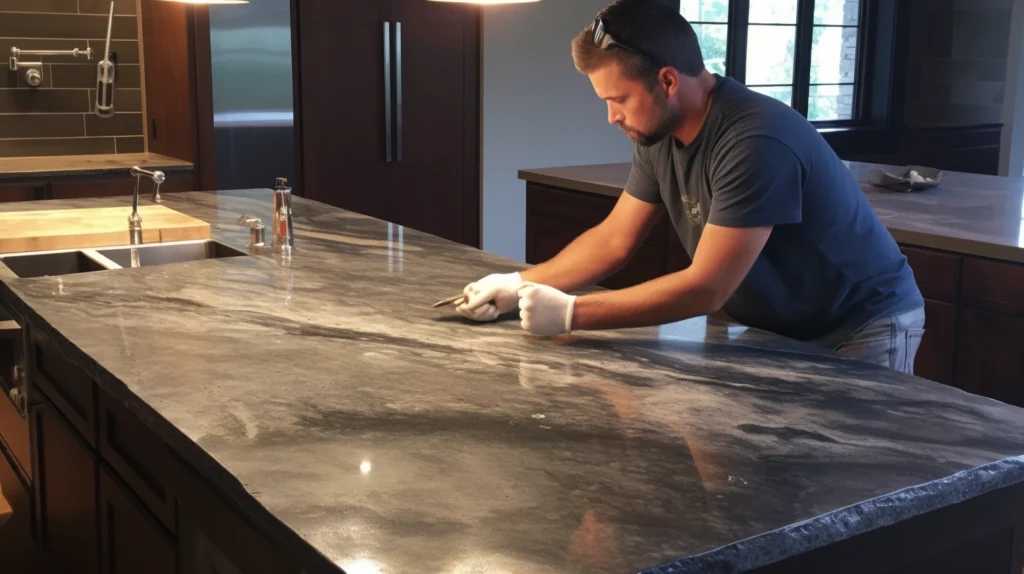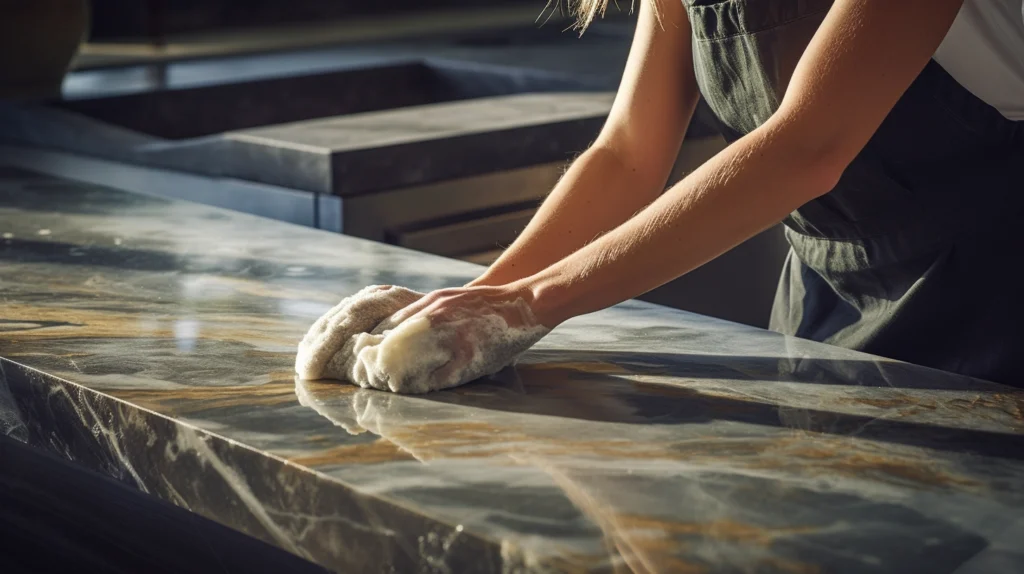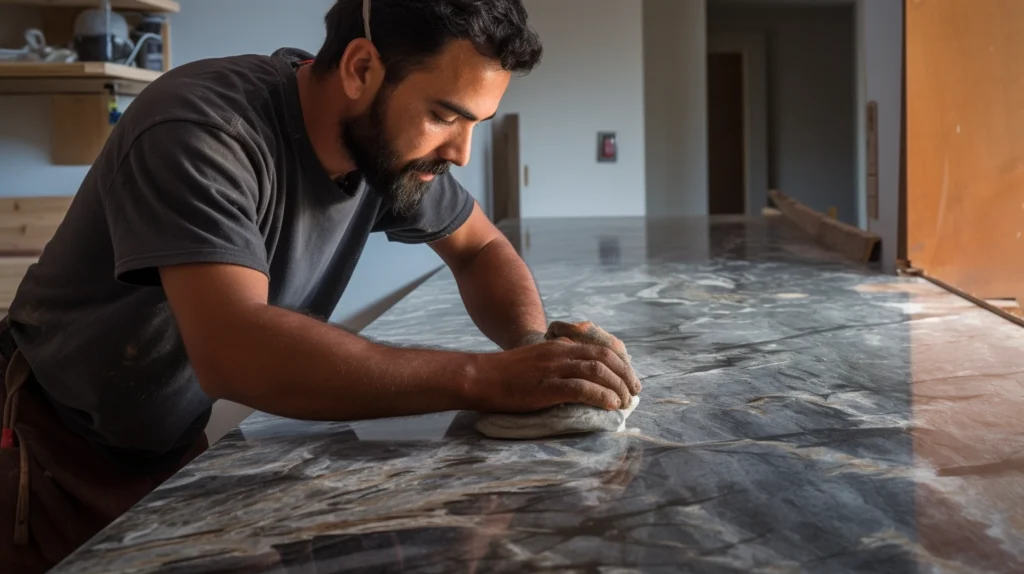When it comes to enhancing the aesthetic appeal and functionality of a home, stone countertops stand as a popular choice, revered for their timeless elegance and enduring strength. Natural wonders, made from the earth and transformed into beautiful surfaces, enhance the appearance of kitchens and bathrooms. They also provide a long-lasting and environmentally friendly option for contemporary living areas.
The allure of stone countertops lies in their unique patterns, colors, and textures. Different types of stone like granite, marble, quartz, and others have their own unique beauty which can enhance any space. This diversity ensures that no two stone countertops are exactly alike, offering homeowners a touch of bespoke luxury.
Moreover, stone countertops are not just about visual appeal. Their resilience against wear and tear makes them a practical choice for busy households. Capable of withstanding heat, resisting scratches, and enduring the rigors of daily use, these surfaces blend functionality with finesse, making them a wise investment for those seeking both style and substance in their home décor.
However, the beauty and longevity of stone countertops largely depend on proper maintenance. To maintain the beauty of stones and make them last, it is important to understand their unique requirements. This way, they can continue to be a central feature in homes for a long time. Proper care can make your surfaces last longer and look better. This includes protecting them from stains, handling spills, and cleaning regularly.
We explore stone countertops, including different types, maintenance tips, and debunking myths to help you keep them in good condition. From daily cleaning routines to tackling the occasional mishap, this guide aims to equip you with the knowledge and techniques to maintain the beauty and integrity of your stone countertops.

Regular Cleaning and Maintenance
Maintaining the pristine condition of stone countertops is essential for both their appearance and longevity. Regular cleaning and timely maintenance play a crucial role in preserving the natural beauty and durability of these surfaces. Here are some key tips and practices for keeping your stone countertops in top shape:
Daily Cleaning Tips
- Gentle Cleaning: For daily maintenance, a soft cloth or sponge with warm, soapy water is usually sufficient. Avoid harsh chemicals or abrasive cleaners, as they can damage the stone’s surface. A mild dish detergent is a safe choice.
- Immediate Wipe Downs: Spills should be wiped up immediately to prevent staining, especially on porous stones like marble. Acidic substances like lemon juice, vinegar, and red wine can be particularly harmful if left unattended.
- Use of Coasters and Trivets: Protect your stone countertops from potential damage by using coasters under glasses, particularly those containing acidic drinks, and trivets under hot pots and pans.
- Avoiding Direct Cutting: While some stone countertops are scratch-resistant, it’s advisable to use cutting boards to avoid any potential damage to the surface and also to protect your knives.
Dealing with Spills and Stains
- Blotting Spills: In the event of a spill, blot the substance with a paper towel or soft cloth rather than wiping it, as this can spread the spill and increase the stained area.
- Stain Removal: For stains, a paste made from baking soda and water can be effective, especially for oil-based stains. Apply the paste to the stain, cover with plastic wrap, and leave overnight before rinsing off. Be sure to test this method in an inconspicuous area first.
- Refraining from Harsh Scrubbing: If a stain persists, avoid the temptation to scrub harshly, as this can etch the stone’s surface. Instead, consider consulting a professional for stubborn stains.
Regular maintenance of stone countertops not only keeps them looking beautiful but also extends their life. To keep your stone surfaces looking elegant for a long time, follow these simple practices every day. Remember, the key to keeping stone countertops pristine lies in gentle, consistent care.
Preventative Measures for Stone Countertops
To keep stone countertops in good condition, it’s important to not only clean them regularly, but also take preventive measures to avoid damage. By understanding and implementing these preventative measures, you can ensure your stone surfaces remain as stunning as the day they were installed.
Avoiding Scratches and Chips
- Use Protective Mats and Boards: Always use cutting boards when preparing food, and place mats or protective covers under appliances and utensils. This simple practice can prevent scratches and chips that can mar the surface of softer stones like marble.
- Soft Padding for Heavy Objects: When placing heavy objects on your stone countertops, such as kitchen appliances or decorative items, consider using soft padding underneath to avoid etching or cracking the stone.
- Mindful Usage: Be cautious not to drop heavy items onto the countertops and avoid dragging pots, pans, or appliances across the surface.
Protecting Against Heat Damage
- Use Trivets for Hot Items: Always place a trivet or heat-resistant mat under hot pots, pans, or baking dishes. Direct exposure to heat can cause discoloration or even cracking in some types of stone.
- Avoid Direct Sunlight: If your stone countertops are exposed to direct sunlight, consider using window treatments to minimize UV exposure, which can cause certain stones to fade over time.
To protect your stone countertops, include these prevention steps in your daily routine. They assist in preventing typical sources of damage. To maintain the beauty of stone surfaces, it is important to prevent problems rather than just dealing with them when they occur. Take care of your stone countertops regularly and with some planning to keep them beautiful and useful in your home for a long time.
Deep Cleaning and Restoration
Over time, even with meticulous care, stone countertops may require more than just regular cleaning. Deep cleaning and occasional restoration are essential to rejuvenate these surfaces and address issues that regular maintenance can’t resolve.
When to Deep Clean
- Periodic Assessment: It’s a good practice to periodically assess your countertops for signs of dullness, staining, or minor abrasions. This can indicate that it’s time for a deep clean.
- Choosing the Right Products: For deep cleaning, use a cleaner specifically designed for stone. These products can remove tougher stains and buildup without damaging the stone. Avoid using vinegar, lemon juice, or other acidic cleaners that can etch marble, limestone, or travertine.
- Thorough Rinse and Dry: After deep cleaning, make sure to thoroughly rinse the countertops with clean water and dry them with a soft cloth to prevent water spots.
Professional Restoration Services
- Scratch and Chip Repair: For scratches, chips, or etching that go beyond surface level, it might be time to call in a professional. They can perform services like grinding, refinishing, and polishing to restore the countertop’s original appearance.
- Sealing: Some types of stone, especially porous ones like marble and granite, benefit from being sealed. A professional can apply a sealant to protect the stone from stains and etching. Depending on the type of stone and the level of use, this might need to be done annually.
- Polishing: For stones like granite and marble, a professional polish can restore shine and luster. This process removes fine scratches and restores the smooth, reflective surface.
Regular deep cleaning and occasional professional restoration are vital to maintaining the beauty and extending the life of stone countertops. These practices improve the stone’s appearance and prevent wear and tear caused by years of use. By understanding when and how to undertake these processes, you can ensure your stone surfaces remain a lasting and elegant feature in your home.

Special Care for Different Stone Types
Stone countertops come in various materials, each with its unique characteristics and care requirements. Understanding these differences is key to maintaining their beauty and longevity. Here’s a guide on how to care for some of the most popular stone types.
Granite Countertops
- Sealing: Granite is porous and should be sealed annually to protect it from stains.
- Cleaning: Use a gentle cleaner specifically designed for granite to avoid damaging the sealant.
- Avoiding Acids and Harsh Chemicals: Acids can etch the surface of granite, so it’s important to clean up spills from acidic substances like wine or tomato sauce immediately.
Marble Countertops
- Extra Caution with Acids: Marble is particularly susceptible to etching from acidic substances. Use coasters under all glasses, especially those containing alcohol or citrus juices.
- Gentle Cleaning: Clean with a soft cloth and a pH-neutral cleaner designed for marble.
- Regular Sealing: Marble should be sealed more frequently than granite, typically every six months, due to its higher porosity.
Quartz and Engineered Stone
- No Sealing Required: Quartz is non-porous and doesn’t require sealing.
- Simple Cleaning: Use a soft cloth and mild detergent for cleaning. Unlike natural stone, quartz is resistant to staining and does not require special cleaners.
- Heat Sensitivity: Though durable, quartz can be damaged by excessive heat. Always use trivets or hot pads under hot pans.
Limestone and Travertine
- Regular Sealing: These stones are porous and should be sealed regularly.
- Soft Cleaning Approach: Use a soft brush and specially formulated cleaners for limestone or travertine to avoid scratching or etching.
- Immediate Spill Cleanup: Due to their porosity, it’s crucial to clean up spills immediately to prevent staining.
To keep your countertops beautiful and functional for a long time, make sure to customize your care and maintenance routine based on the type of stone used. Each stone type has its unique properties and needs, so understanding these will help you keep your countertops in the best possible condition.
DIY Maintenance Tips
Caring for stone countertops doesn’t always require professional help. There are several effective DIY maintenance tips that can keep your countertops in top condition. Here’s how you can manage the upkeep of your stone surfaces with some simple, at-home solutions.
Homemade Cleaning Solutions
- Gentle Soap Solution: A mixture of mild dish soap and warm water is often enough for daily cleaning. Use a soft cloth or sponge to avoid scratching the surface.
- Baking Soda Paste for Stains: For stubborn stains, especially on more porous stones, a paste made of baking soda and water can be effective. Apply the paste to the stain, cover with plastic wrap, and leave overnight. Gently rinse off the next day.
- Rubbing Alcohol for Disinfection: If you need to disinfect your countertops, a solution of equal parts water and rubbing alcohol can be used. Spray onto the surface and let it sit for a few minutes before wiping it off with a clean cloth.
Polishing and Sealing at Home
- Commercial Sealants: You can buy commercial sealants for stone countertops and apply them yourself. Make sure the product is suitable for your specific type of stone. Follow the instructions carefully, applying the sealant evenly and allowing it to set as directed.
- Polishing: For some stones like granite, DIY polishing kits are available. These usually include a buffing compound and a special pad that you can use with a household drill. Ensure to follow the instructions to avoid damaging the stone.
- Regular Check-ups: Periodically check your countertops for signs of wear, such as dull spots or water not beading up, which indicate it’s time to reseal or polish.
Remember, while DIY methods are effective for regular maintenance, certain situations like deep scratches or complex restorations might require professional attention. Regularly employing these DIY maintenance tips, however, can greatly reduce the need for professional interventions and keep your stone countertops looking beautiful for years.
Conclusion: Ensuring Longevity and Beauty
In conclusion, the key to maintaining the beauty and longevity of stone countertops lies in a combination of regular cleaning, timely maintenance, and understanding the specific needs of your stone type. Whether you have granite, marble, quartz, or another kind of stone, each requires a tailored approach to care and preservation.
Adopting a routine of gentle daily cleaning, using the right products, and promptly addressing spills and stains goes a long way in preserving the pristine condition of your countertops. Equally important is being mindful of preventative measures such as using cutting boards, coasters, and trivets to protect the surface from potential damage.
For deeper cleaning and restoration needs, don’t hesitate to seek professional help, especially when dealing with more delicate stones like marble or limestone. However, many aspects of stone care can be effectively managed with DIY approaches, from homemade cleaning solutions to applying sealants and polish.
Remember, your stone countertops are not just a functional aspect of your home; they are an investment in its beauty and value. By dedicating time and effort to their care, you can ensure that they remain a stunning feature of your home for many years to come. Embrace the routine of stone maintenance as part of the joy of living in a space that reflects natural beauty and your commitment to preserving it.





